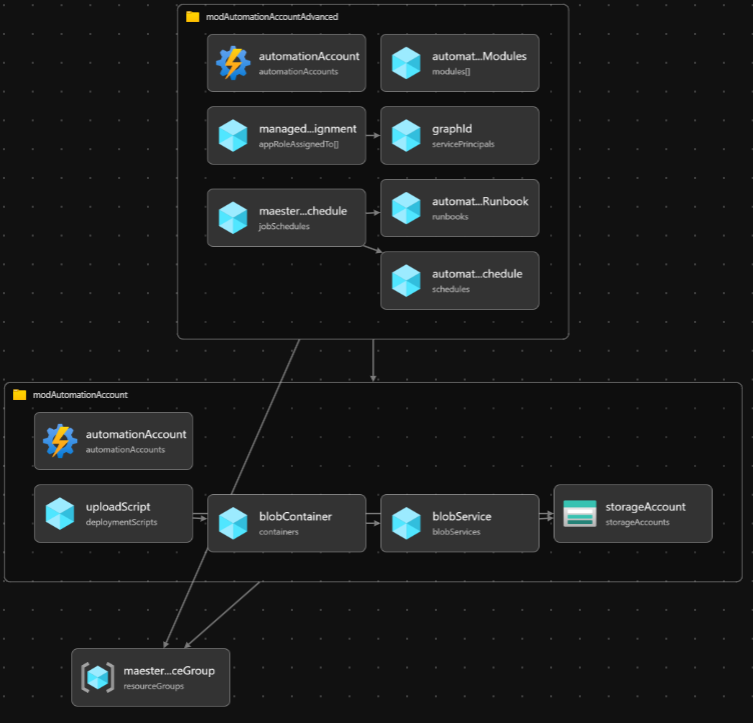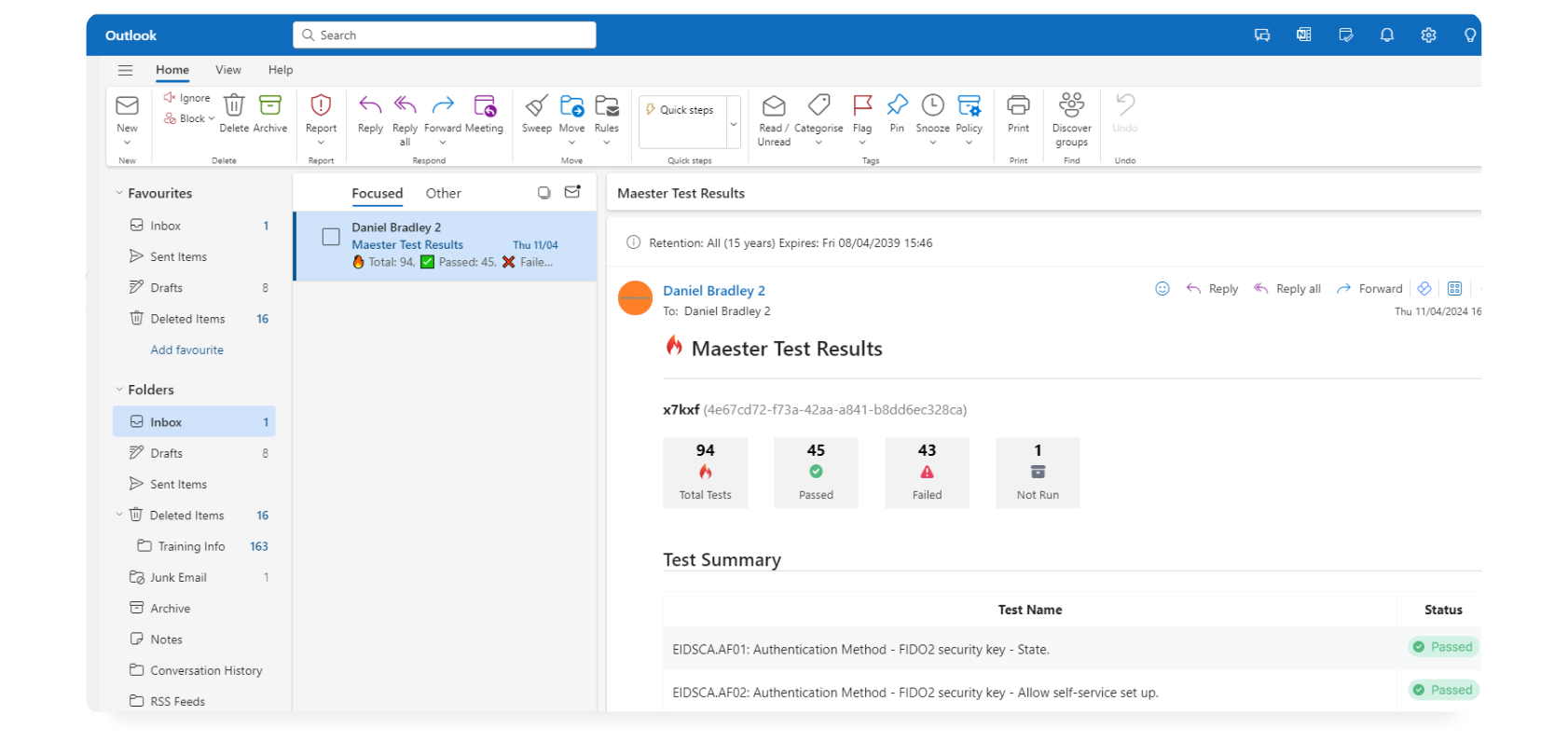Setup Maester in Azure Automation using Azure Bicep
This guide will demonstrate how to get started with Maester and provide an Azure Bicep template to automate the deployment of Maester with Azure Automation.
- This setup will enable you to perform monthly security configuration checks on your Microsoft tenant and receive email alerts 🔥
Why Azure Automation & Azure Bicep?
Azure Automation provides a simple and effective method to automate email reporting with Maester. Azure Automation has a free-tier option, giving you up to 500 minutes of execution each month without additional cost. Azure Bicep is a domain-specific language that uses declarative syntax to deploy Azure resources. It simplifies the process of defining, deploying, and managing Azure resources. Here’s why Azure Bicep stands out:
- Simplified Syntax: Bicep provides concise syntax, reliable type safety, and support for reusing code.easier to read.
- Support for all resource types and API versions: Bicep immediately supports all preview and GA versions for Azure services.
- Modular and Reusable: Bicep enables the creation of modular templates that can be reused across various projects, ensuring consistency and minimizing duplication.

Pre-requisites
- If this is your first time using Microsoft Azure, you must set up an Azure Subscription so you can create resources and are billed appropriately.
- You must have the Global Administrator role in your Entra tenant. This is so the necessary permissions can be consented to the Managed Identity.
- You must also have Azure Bicep & Azure CLI installed on your machine, this can be easily done with, using the following commands:
winget install -e --id Microsoft.AzureCLI
winget install -e --id Microsoft.Bicep
Template Walkthrough
This section will guide you through the templates required to deploy Maester on Azure Automation Accounts. Depending on your needs, this can be done locally or through CI/CD pipelines.
- For instance, using your favorite IDE such as VS Code.
- Alternatively, through Azure DevOps.
To be able to declare Microsoft Graph resources in a Bicep file, you need to enable the Bicep preview feature and specify the Microsoft Graph Bicep type versions, by configuring bicepconfig.json
{
"experimentalFeaturesEnabled": {
"extensibility": true
},
// specify an alias for the version of the v1.0 dynamic types package you want to use
"extensions": {
"microsoftGraphV1": "br:mcr.microsoft.com/bicep/extensions/microsoftgraph/v1.0:1.0.0"
}
}
The main.bicepparam template defines our input parameters, such as the environment, customer, location, and app roles for the Managed Identity (MI).
using 'main.bicep'
// Defing our input parameters
param __env__ = 'prod'
param __cust__ = 'ct'
param __location__ = 'westeurope'
param __maesterAppRoles__ = [
'Directory.Read.All'
'DirectoryRecommendations.Read.All'
'IdentityRiskEvent.Read.All'
'Policy.Read.All'
'Policy.Read.ConditionalAccess'
'PrivilegedAccess.Read.AzureAD'
'Reports.Read.All'
'RoleEligibilitySchedule.Read.Directory'
'RoleManagement.Read.All'
'SecurityIdentitiesSensors.Read.All'
'SecurityIdentitiesHealth.Read.All'
'SharePointTenantSettings.Read.All'
'ThreatHunting.Read.All'
'UserAuthenticationMethod.Read.All'
'Mail.Send'
]
param __maesterAutomationAccountModules__ = [
{
name: 'Maester'
uri: 'https://www.powershellgallery.com/api/v2/package/Maester'
}
{
name: 'Microsoft.Graph.Authentication'
uri: 'https://www.powershellgallery.com/api/v2/package/Microsoft.Graph.Authentication'
}
{
name: 'Pester'
uri: 'https://www.powershellgallery.com/api/v2/package/Pester'
}
{
name: 'NuGet'
uri: 'https://www.powershellgallery.com/api/v2/package/NuGet'
}
{
name: 'PackageManagement'
uri: 'https://www.powershellgallery.com/api/v2/package/PackageManagement'
}
]
The main.bicep template serves as the entry point for our Bicep configuration. It defines the parameters and variables used across the various modules.
metadata name = 'Maester Automation as Code <3'
metadata description = 'This Bicep code deploys Maester Automation Account with modules and runbook for automated report every month via e-mail'
metadata owner = 'Maester'
metadata version = '1.0.0'
targetScope = 'subscription'
extension microsoftGraphV1
@description('Defing our input parameters')
param __env__ string
param __cust__ string
param __location__ string
param __maesterAppRoles__ array
param __maesterAutomationAccountModules__ array
@description('Defining our variables')
var _maesterResourceGroupName_ = 'rg-maester-${__env__}'
var _maesterAutomationAccountName_ = 'aa-maester-${__env__}'
var _maesterStorageAccountName_ = 'sa${__cust__}maester${__env__}'
var _maesterStorageBlobName_ = 'maester'
var _maesterStorageBlobFileName_ = 'maester.ps1'
@description('Resource Group Deployment')
resource maesterResourceGroup 'Microsoft.Resources/resourceGroups@2023-07-01' = {
name: _maesterResourceGroupName_
location: __location__
}
@description('Module Deployment')
module modAutomationAccount './modules/aa.bicep' = {
name: 'module-automation-account-deployment'
params: {
__location__: __location__
_maesterAutomationAccountName_: _maesterAutomationAccountName_
_maesterStorageAccountName_: _maesterStorageAccountName_
_maesterStorageBlobName_: _maesterStorageBlobName_
_maesterStorageBlobFileName_: _maesterStorageBlobFileName_
}
scope: maesterResourceGroup
}
module modAutomationAccountAdvanced './modules/aa-advanced.bicep' = {
name: 'module-automation-account-advanced-deployment'
params: {
__location__: __location__
__ouMaesterAutomationMiId__: modAutomationAccount.outputs.__ouMaesterAutomationMiId__
__ouMaesterScriptBlobUri__: modAutomationAccount.outputs.__ouMaesterScriptBlobUri__
_maesterAutomationAccountName_: _maesterAutomationAccountName_
__maesterAppRoles__: __maesterAppRoles__
__maesterAutomationAccountModules__: __maesterAutomationAccountModules__
}
scope: maesterResourceGroup
}
The aa.bicep module-file, automates the deployment of the Maester Azure Automation Account, a Storage Account, a container and uploads the Maester script to the Blob Container, which will be later used as input for our PowerShell runbook for the automation account to generate a security report.
param __location__ string
param _maesterAutomationAccountName_ string
param _maesterStorageAccountName_ string
param _maesterStorageBlobName_ string
param _maesterStorageBlobFileName_ string
@description('Automation Account Deployment')
resource automationAccount 'Microsoft.Automation/automationAccounts@2023-11-01' = {
name: _maesterAutomationAccountName_
location: __location__
identity: {
type: 'SystemAssigned'
}
properties: {
sku: {
name: 'Basic'
}
}
}
resource storageAccount 'Microsoft.Storage/storageAccounts@2022-09-01' = {
name: _maesterStorageAccountName_
location: __location__
sku: {
name: 'Standard_LRS'
}
kind: 'StorageV2'
properties: {
accessTier: 'Hot'
allowBlobPublicAccess: true
networkAcls: {
defaultAction: 'Allow'
}
}
}
@description('Create Blob Service')
resource blobService 'Microsoft.Storage/storageAccounts/blobServices@2022-09-01' = {
parent: storageAccount
name: 'default'
}
@description('Create Blob Container')
resource blobContainer 'Microsoft.Storage/storageAccounts/blobServices/containers@2022-09-01' = {
parent: blobService
name: _maesterStorageBlobName_
properties: {
publicAccess: 'Blob'
}
}
@description('Upload .ps1 file to Blob Container using Deployment Script')
resource uploadScript 'Microsoft.Resources/deploymentScripts@2020-10-01' = {
name: 'deployscript-upload-blob-maester'
location: __location__
kind: 'AzureCLI'
properties: {
azCliVersion: '2.26.1'
timeout: 'PT5M'
retentionInterval: 'PT1H'
environmentVariables: [
{
name: 'AZURE_STORAGE_ACCOUNT'
value: storageAccount.name
}
{
name: 'AZURE_STORAGE_KEY'
secureValue: storageAccount.listKeys().keys[0].value
}
{
name: 'CONTENT'
value: loadTextContent('../pwsh/maester.ps1')
}
]
scriptContent: 'echo "$CONTENT" > ${_maesterStorageBlobFileName_} && az storage blob upload -f ${_maesterStorageBlobFileName_} -c ${_maesterStorageBlobName_} -n ${_maesterStorageBlobFileName_}'
}
dependsOn: [
blobContainer
]
}
@description('Outputs')
output __ouMaesterAutomationMiId__ string = automationAccount.identity.principalId
output __ouMaesterScriptBlobUri__ string = 'https://${_maesterStorageAccountName_}.blob.${environment().suffixes.storage}/${_maesterStorageBlobName_}/maester.ps1'
The aa-advanced.bicep module file automates the configuration of the Maester Azure Automation Account by setting up role assignments, installing necessary PowerShell modules, creating a runbook, defining a schedule, and associating the runbook with the schedule. This configuration enables Maester to run automatically in Azure according to the specified schedule. This module is separate due to the need for replicating the Managed Service Identity (MSI) in Entra ID. By dividing the configuration into two module files, we can add the API consents 💪🏻
extension microsoftGraphV1
param __location__ string
param __maesterAppRoles__ array
param __maesterAutomationAccountModules__ array
param __ouMaesterAutomationMiId__ string
param __ouMaesterScriptBlobUri__ string
param _maesterAutomationAccountName_ string
param __currentUtcTime__ string = utcNow()
@description('Role Assignment Deployment')
resource graphId 'Microsoft.Graph/[email protected]' existing = {
appId: '00000003-0000-0000-c000-000000000000'
}
resource managedIdentityRoleAssignment 'Microsoft.Graph/[email protected]' = [for appRole in __maesterAppRoles__: {
appRoleId: (filter(graphId.appRoles, role => role.value == appRole)[0]).id
principalId: __ouMaesterAutomationMiId__
resourceId: graphId.id
}]
@description('Existing Automation Account')
resource automationAccount 'Microsoft.Automation/automationAccounts@2023-11-01' existing = {
name: _maesterAutomationAccountName_
}
@description('PowerShell Modules Deployment')
resource automationAccountModules 'Microsoft.Automation/automationAccounts/modules@2023-11-01' = [ for module in __maesterAutomationAccountModules__: {
name: module.name
parent: automationAccount
properties: {
contentLink: {
uri: module.uri
}
}
}]
@description('Runbook Deployment')
resource automationAccountRunbook 'Microsoft.Automation/automationAccounts/runbooks@2023-11-01' = {
name: 'runBookMaester'
location: __location__
parent: automationAccount
properties: {
runbookType: 'PowerShell'
logProgress: true
logVerbose: true
description: 'Runbook to execute Maester report'
publishContentLink: {
uri: __ouMaesterScriptBlobUri__
}
}
}
@description('Schedule Deployment')
resource automationAccountSchedule 'Microsoft.Automation/automationAccounts/schedules@2023-11-01' = {
name: 'scheduleMaester'
parent: automationAccount
properties: {
expiryTime: '9999-12-31T23:59:59.9999999+00:00'
frequency: 'Month'
interval: 1
startTime: dateTimeAdd(__currentUtcTime__, 'PT1H')
timeZone: 'W. Europe Standard Time'
}
}
@description('Runbook Schedule Association')
resource maesterRunbookSchedule 'Microsoft.Automation/automationAccounts/jobSchedules@2024-10-23' = {
name: guid(automationAccount.id, 'runbook', 'schedule')
parent: automationAccount
properties: {
parameters: {}
runbook: {
name: automationAccountRunbook.name
}
schedule: {
name: automationAccountSchedule.name
}
}
}
The PowerShell script as part of the Automation Runbook for a simple and effective method to automate email reporting with Maester.
#Connect to Microsoft Graph with System-Assigned Managed Identity
Connect-MgGraph -Identity
#Define mail recipient
$MailRecipient = "[email protected]"
#create output folder
$date = (Get-Date).ToString("yyyyMMdd-HHmm")
$FileName = "MaesterReport" + $Date + ".zip"
$TempOutputFolder = $env:TEMP + $date
if (!(Test-Path $TempOutputFolder -PathType Container)) {
New-Item -ItemType Directory -Force -Path $TempOutputFolder
}
#Run Maester report
cd $env:TEMP
md maester-tests
cd maester-tests
Install-MaesterTests .\tests
Invoke-Maester -MailUserId $MailRecipient -MailRecipient $MailRecipient -OutputFolder $TempOutputFolder
Deployment
- You have the flexibility to deploy either based on deployment stacks or directly to the Azure Subscription.
- Using Deployment Stacks allows you to bundle solutions into a single package, offering several advantages
- Management of resources across different scopes as a single unit
- Securing resources with deny settings to prevent configuration drift
- Easy cleanup of development environments by deleting the entire stack
Directly deployed based:
#Connect to Azure
Connect-AzAccount
#Getting current context to confirm we deploy towards right Azure Subscription
Get-AzContext
# If not correct context, change, using:
# Get-AzSubscription
# Set-AzContext -SubscriptionID "ID"
#Deploy to Azure Subscription
New-AzSubscriptionDeployment -Name Maester -Location WestEurope -TemplateFile .\main.bicep -TemplateParameterFile .\main.bicepparam
Deployment Stack based:
#Connect to Azure
Connect-AzAccount
#Getting current context to confirm we deploy towards right Azure Subscription
Get-AzContext
# If not correct context, change, using:
# Get-AzSubscription
# Set-AzContext -SubscriptionID "ID"
#Change DenySettingsMode and ActionOnUnmanage based on your needs..
New-AzSubscriptionDeploymentStack -Name Maester -Location WestEurope -DenySettingsMode None -ActionOnUnmanage DetachAll -TemplateFile .\main.bicep -TemplateParameterFile .\main.bicepparam
Viewing the test results

FAQ / Troubleshooting
- Ensure you have the latest version of Azure Bicep, as the
microsoftGraphV1module depends on the newer versions
Contributors
- Original author: Daniel Bradley | Microsoft MVP
- Co-author: Brian Veldman | Technology Enthusiast